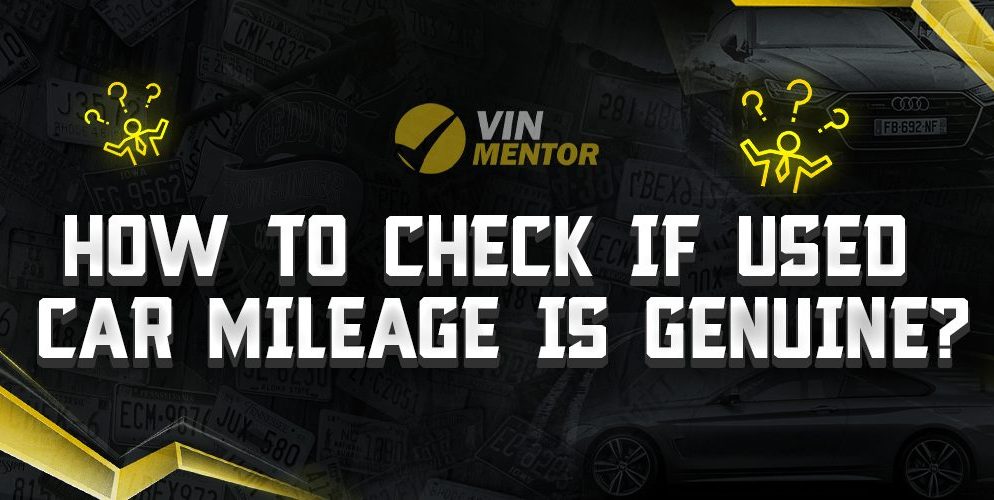

Every day we come across somebody who was the victim of a scam because they needed to be more careful. We would hate for you to make that mistake when buying a used car. When checking the car’s mileage, you need to know if it is genuine.
You can check service and maintenance records and car history reports, look for wear and tear and mileage inconsistencies, inspect the vehicle, and run a compression test on the car to ensure the car mileage is genuine.
This article goes into further detail about checking car mileage and why this is so important.
How To Check Car Mileage?
There are mathematical calculations that you can manually carry out to find the number of miles your car has run. The mathematical calculations include using the quantity of fuel used as well. Car manufacturers have made the job easier and installed an odometer in vehicles.
An odometer is a device that measures the total distance traveled by a vehicle. It is usually attached to the vehicle’s dashboard and records the distance traveled in miles or kilometers since the car was purchased. The odometer is used to check the car mileage.
How To Check If The Odometer Of A Car Is Tampered With?
It’s part of the precautions to check for tampering. Here’s how you can manage it.
Get A Car Technician To Check The Car Meter
If you are not that savvy to inspect a car when it comes to the manufacturing and components of vehicles, your best bet is to see a car technician. Ask your seller if you can take the car for an independent inspection before buying it. Ideally, the seller should agree, but if they are reluctant, that may mean they have something to hide.
Once at the technician’s, if you get permission from the seller, let the technician know what you need to be checked; the odometer should be at the top of the list.
Compare The Wear And Tear To The Mileage
The wear and tear of a car can be compared to the mileage in several ways. One way to compare the two is to look at how much the car has been driven and how well it has been maintained. If the car has been driven a lot and is showing signs of wear and tear, then it is likely that the mileage is high. If the car has been well maintained and is in good condition, then it is likely that the mileage is lower.
Additionally, if the car has had regular maintenance, then it is likely that the wear and tear are lower than if the car had been neglected. The car mileage is genuine if the wear and tear correspond to the mileage on the odometer.
Take A Look At Maintenance And Service Records
Each car owner must get maintenance done regularly, but more importantly, keep a record of it. All the receipts from each maintenance trip should be saved. You can ask your seller for these reports to check if the maintenance trips and dates match the mileage on the car.
Some workshops ensure to add the mileage data from every maintenance trip on the receipts. This could help you figure out if the number on the odometer is right.
To cross-check the maintenance reports, you could get a car history report online by using the VIN of the car.
Run A Compression Test On Your Car
- Prepare the vehicle: Ensure the engine is off and the parking brake is set. If the vehicle has a manual transmission, put the shifter in neutral.
- Locate the spark plug wire: This is usually found on the side of the engine block.
- Attach the compression tester: Use a socket wrench to remove the spark plug boot and attach the compression tester to the spark plug hole.
- Connect the compression tester to the gauge: Connect the compression tester to the gauge to measure the pressure.
- Start the engine: Allow it to idle for a few seconds to get the cylinders up to operating temperature.
- Check the compression: Read the gauge and record the pressure. Repeat this step for each cylinder.
- Analyze the results: Compare the readings for each cylinder. If the readings are significantly different, it could indicate a problem with the cylinder.
To indicate the engine’s mileage, compare the readings to the manufacturer’s specifications. Generally, an engine with higher mileage will have lower compression readings than a newer engine. If the readings are significantly lower than the manufacturer’s specifications, this could indicate an engine with high mileage.
Compare The Car Average To The Mileage
Comparing a car’s average to its mileage requires gathering data on both aspects. A car’s average can be measured by calculating the average fuel economy of the car over a certain period or distance.
The car’s mileage can be measured by tracking how many miles it has been driven since it was purchased or since the odometer was last reset. Once the data on the car’s average and its mileage have been collected, they can be compared to see if there is a correlation between them.
When you have the necessary data, you can decide if the used car has good mileage.
What Happens If Car Mileage Is Not Genuine?
If a car’s mileage is not genuine, it could indicate that the car has been tampered with or that the odometer has been rolled back to make the car appear to have fewer miles than it does. This can greatly decrease the car’s resale value and could lead to legal repercussions for the seller if they are found to be misrepresenting the car’s condition or history.
You could face several issues if you buy a car with high mileage while the odometer shows a lower mileage.
- Lower Resale Value: High-mileage cars often have a lower resale value and may not be worth as much if you decide to sell them.
- Higher Insurance Rates: Insurance companies usually charge a higher rate for high-mileage cars due to the higher risk of having a breakdown.
- Poor Fuel Economy: As the vehicle has aged, its fuel efficiency may have decreased, leading to higher fuel costs.
- Less Performance: High mileage cars often reduce performance due to the engine’s and other components’ wear and tear.
Conclusion
Precautionary measures always help. If you lose a good deal on a rare car you loved, it might sting, but it is better to buy a car from someone lying. Precautionary measures always help you stay out of any trouble or hassle. Better safe than sorry!












